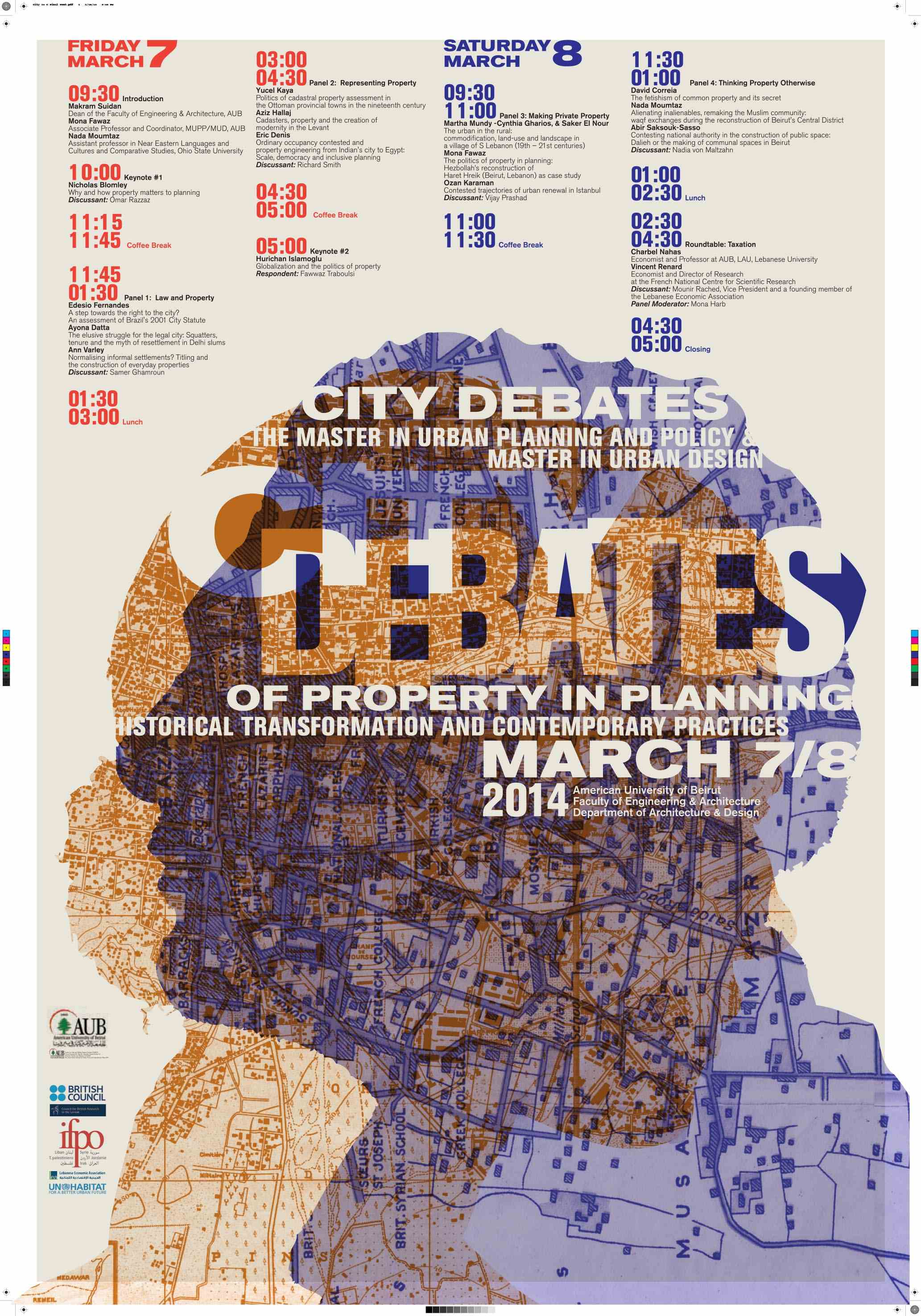City Debates is a yearly conference organized by the Masters in Urban Planning & Policy and Masters in Urban Design Programs at the American University of Beirut. Started in 2002, City Debates brings together professionals, academics, and students from Beirut and beyond to explore issues of contemporary relevance to the urbanization of the region. The series aims to document, analyze, and compare emerging practices that are transforming the cities and regions of the Middle-East. It also aims to foster a platform of exchange at the regional level where investigative frameworks are proposed and practical experiences and know-how are shared. By carefully selecting each year a timely theme to address, City Debates` ambition is to propose innovative ways of understanding contemporary urbanization and to usher creative strategies to respond to the daunting challenges. It is also to inscribe a debate about the specificities of our region outside the traditional middle-eastern exceptionalism in which it is often trapped. In previous years, City Debates has addressed Master Planning in Lebanon, Cultural Heritage and the Politics of the Present, Spaces of Faith and Fun, Security of/in the City, Urbanism in the Arab World, Emerging Practices in Urban Design, and Rethinking Informality: Design Tactics/Planning Strategies. This website gives access to previous conferences programs as well as their published outputs.
This year’s City Debates is entitled Of Property in Planning: Historical Transformations and Contemporary Practices. The global financial crisis in the sub-prime mortgage crisis and the increasing exclusion of most city-dwellers from access to affordable housing has brought to the fore the dramatic effects of the domination of the exchange value of land and housing stock, used as commodities to generate profit, over their use-value as shelters, as David Harvey has shown in his work. Furthermore, the devastating powers of real estate markets over urban landscapes and their ability to trump all other processes of spatial transformation have eloquently reflected the consequences of a strictly propertied understanding of the natural and built environments. This has driven many (Peter Marcuse, Vincent Renard, as well as, earlier, Henri Lefebvre) to think both of different models of property and of tax-policies, in order to restrict speculation, provide shelter, and empower non-propertied claims over the. City Debates 2014 is an attempt to put such proposals and concerns in conversation with recent debates on property in anthropology, geography, history, law, and planning. By bringing policy-oriented proposals with critical discussions, the conference hopes to allow for a critical assessment of how these new models and proposals can work in the world around us, particularly in the Arab Middle-East. The conference program, bios and abstracts is accessible here.
American University of Beirut, FEA, Department of Architecture and Design
City Debates 2014, March 7-8
Of Property in Planning: Historical Transformations and Contemporary Practices
Friday 7 March
9:30 Introduction
- Makram Suidan, Dean of the Faculty of Engineering & Architecture, AUB
- Mona Fawaz, Associate Professor and Coordinator, MUPP/MUD, AUB
- Nada Moumtaz, Assistant professor in Near Eastern Languages and Cultures and Comparative Studies, Ohio State University
10:00 Keynote
- Nicholas Blomley - Why and how property matters to planning
- Discussant: Omar Razzaz
11:15-11:45 Coffee Break
11:45-1:30 Panel 1: Law and Property
- Edesio Fernandes - A step towards the right to the city? An assessment of Brazil`s 2001 City Statute
- Ayona Datta - The elusive struggle for the legal city: Squatters, tenure and the myth of resettlement in Delhi slums
- Ann Varley - Normalising informal settlements? Titling and the construction of everyday properties
- Discussant: Samer Ghamroun
1:30-3:00 Lunch
3:00-4:30: Panel 2: Representing Property
- Yucel Kaya - Politics of cadastral property assessment in the Ottoman provincial towns in the nineteenth century
- Aziz Hallaj - Cadasters, property and the creation of Modernity in the Levant
- David Correia - The fetishism of common property and its secret
- Discussant: Richard Smith
4:30-5:00 Coffee Break
5:00 Interactive Presentation
- Land Politics in a neoliberal monarchical state, by the Seas of Sand Research Collective
- Respondent: Fawwaz Traboulsi
Saturday 8 March
9:30-11:00 Panel 3: Making Private Property
- Martha Mundy, Cynthia Gharios, & Saker El Nour - The urban in the rural: commodification, land-use and landscape in a village of S Lebanon (19th – 21st centuries)
- Mona Fawaz - The politics of property in planning: Hezbollah’s reconstruction of Haret Hreik (Beirut, Lebanon) as case study
- Ozan Karaman - Contested trajectories of urban renewal in Istanbul
- Discussant: Vijay Prashad
11:00-11:30 Coffee Break
11:30am-1pm Panel 4: Thinking Property Otherwise
- Nada Moumtaz - Alienating inalienables, remaking the Muslim community: waqf exchanges during the reconstruction of Beirut`s Central District
- Abir Saksouk-Sasso - Contesting national authority in the construction of public space: Dalieh or the making of communal spaces in Beirut
- Discussant: Nadia von Maltzahn
1:00-2:30 Lunch
2:30-4:30 Roundtable: Taxation
- Charbel Nahas, Economist and Professor at AUB, LAU, Lebanese University
- Vincent Renard, Economist and Director of Research at the French National Centre for Scientific Research
- Discussant: Mounir Rached, Vice President and a founding member of the Lebanese Economic Association
- Panel Moderator: Mona Harb
4:30-5:00 Closing
